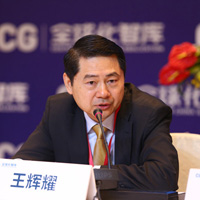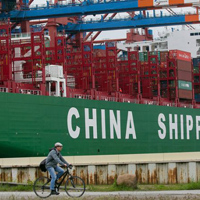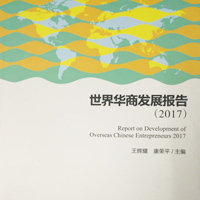���������������������������������������������
CCG持续关注国际关系议题,推动中国与全球化的发展,积极开展国际交流,充分发挥智库“二轨外交”作用,在巴黎和平论坛、达沃斯世界经济论坛、慕尼黑安全会议等重要国际政策与意见交流平台上组织分论坛、边会、圆桌会议、晚宴等活动,促进国际政商学界对话,凝聚共识;CCG积极与各国政界、智库界、工商界开展“二轨外交”活动,每年常态化赴多国调研与交流,促进中外关系攸关方互动,保持与多国政策圈层的沟通渠道。
-

[China Daily]Seizing the opportunity to recruit more foreigners
Wang Huiyao, president of CCG. 9,April, 2017 / Photo provided to chinadaily.com.cnChina should make the most of the flow of capital and talent across the world driven by globalization, says Wang Huiyao, founder and president of the leading Beijing-based think-tank the Center for China and Globalization. The following is an excerpt from Wang’s speech at the 3rd China and Globalization Roundtable Forum.The WTO and IMF are two organizations which were designed to regulate global trade and finance, while apparently an international immigration authority is far from a requirement. There is no such agency right now to manage the flow of talent worldwide.Attractive destinations like the US have the largest talent inflow, topping the world, while China, on the other side of the Pacific Ocean sees the least population of international talents as the ratio of foreign students studying in China is among the lowest in the world.Chinese multinational enterprises are crucial to attracting smart brains to enlarge our high-level labor pool. Those companies like Huawei and Alibaba, now have adopted the idea of "using the talents instead of owning them". Such multinational enterprises could consider establishing research centers overseas to attract local and international talents to work there.With the tightening immigration policy of the new US administration, China faces an opportunity and challenge.Breakthroughs have been made recently on China’s international talent policies. In January 2016, the Ministry of Public Security announced Beijing city would ease rules to facilitate foreigners’ coming in and out and provide favorable terms for them to acquire permanent residence.The new regulations will also allow short-term internships in Beijing for foreign students and permit them to run their own start-ups. The same policy has also been adopted by Shanghai, Guangdong and Fujian Province.Apart from taking advantage of the Belt and Road Initiative to attract more international talents, we also need to figure out a way of to attract and nurture more foreign students. We also need to send more national talents to international organizations.From China Daily,2017-4-24
2017年4月25日 -

[China Daily] Sino-US trade ties ’benefit both’
He Weiwen, Senior fellow at Center for China and Globalization (CCG) and a former diplomat, says the recent meeting between President Xi Jinping and US President Donald Trump pointed to a return to normalcy. ZHANG WEI / CHINA DAILY Chinese manufacturers could prove to be solution to Trump’s Rust Belt job problem, says former diplomatHe Weiwen believes that despite the previous rhetoric, trade relations between the United States and China could be back on track.During his election campaign, US President Donald Trump threatened to impose a 45 percent tariff on imported Chinese goods.But the 72-year-old former diplomat believes the recent meeting between President Xi Jinping and Trump at the Mar-a-Lago resort in Florida pointed to a return to normalcy."The meeting again anchored China-US relations on the fundamental principle of managing differences through dialogue," he says.Trump also indicated on April 16 that the US is not going to declare China a "currency manipulator", something he had pledged he would do during his election campaign.He, a former economic and commercial counselor in the Chinese consulates general in San Francisco and New York, says the measures that Trump intended to impose were never realistic options."The currency manipulator label on China certainly looks unlikely for the moment. It may, of course, crop up again later depending on the trade issues," he says."The across the board 45 percent duty on Chinese goods would never have happened, even if the Mar-a-Lago meeting had not taken place. Duties could still be applied on selected Chinese goods."The US had a $347 billion trade deficit with China in 2016, with US exports to China just $116 billion, compared with imports from the world’s second-largest economy of $463 billion."Despite this level of deficit, I still believe the relationship benefits both sides. The trade imbalance is just the logical outcome of the different position the two countries occupy in the global supply chain."Although the US has these huge trade deficits, it benefits tremendously from lower prices from cheaper imports and the consequent effect this has on real earnings in the country."He, who was speaking from the offices of the Center for China& Globalization at Hanwei Plaza in Beijing, where he is a senior fellow, also believes that even before the first 100 days of the Trump presidency ends on April 29, there is room further agreements."China and the US should be able to work out practical ways and even projects, even within the 100 days, to increase the exports of US goods and services to China and provide the Chinese with more market access to the US."He, a highly respected figure who has written a number of books and regularly gives speeches at leading US and European universities, subscribes to the view that Chinese manufacturers could prove to be the solution to Trump’s Rust Belt job problem. Fuyao, the Chinese autoglass maker, opened a plant in Ohio in October, which is expected to create 3,000 jobs."Both sides should work out a concrete plan and pathway to increase Chinese greenfield investment in the US manufacturing sector and also become involved in US infrastructure investment projects."He, who is also the author of about 300 papers and articles, believes this is a far easier way of creating jobs than Trump persuading US manufacturers to move their plants back from China."There is just no point in General Motors moving its China operations back to the US. They have 10 assembly plants in China selling to the local market, which is the biggest in the world."He was born in Yudu County in Jiangxi province, although his family originated from Yiwu in Zhejiang province on China’s eastern seaboard.His father, He Zhengsen, an academic engineer who had studied in Paris, was a leading expert on hydropower stations.He, who was also partly brought up in Nanjing, Jiangsu province, went on to study foreign trade economics at the Beijing Institute of Foreign Trade (now the University of International Business and Economics).In 1968, during the "cultural revolution" (1966-76), he was sent to Inner Mongolia, initially as a farm laborer and then as a teacher."Our family was all split up. My younger brother and two younger sisters all worked on farms too. My father suffered a lot because he had been educated in Europe."After the turmoil was over, He went to work for the International Trade Research Institute, where he worked for more than 10 years.In 1984, he moved to be officer-in-charge of the China International Information Center, for which he was sent to Cologne, Germany, to set up a European office."It was there that I learned how businesses could be done. I also experienced first-hand the advanced technology of German companies, which left a deep impression. Everything was also rules based, whereas in China, it was all about good relations with your boss and the government. This did not matter in Germany."At the end of the 1990s, He became economic and commercial counselor at the Chinese Consulate General in San Francisco, moving on to the same role in New York.It was a time when China’s trade status was being reviewed annually by the US Congress, which created uncertainty in trade relations between the two countries. When China became a member of the World Trade Organization in 2001, the US had to give China favored nation status without condition."This whole issue has come up again recently with Donald Trump saying he wants to review this. There is, however, a separate commission for that, since it is a core principle of the WTO. If the US wants to withdraw this status, then it has to quit the WTO itself," he says.He was involved in contributing ideas to the final communique of the G20 Summit in Hangzhou in September."I believe there were some major changes made in Hangzhou. It no longer was the big countries club. I think it was important to converge the G20 agenda with the UN 2030 agenda for sustainable development," he says.One of the themes of the G20 was industrialization in Africa, which He believes will become one of the defining trends of the 21st century."I believe Africa could make up 10 to 15 percent of industrial output within one or two generations. The continent has huge human capital. Its population is expected to double to 2 billion within 35 years. Western economies as well as Japan and China have aging, declining populations," he says.He says President Xi’s defense of globalization at the World Economic Forum in Davos in January was also a landmark event.The former diplomat says that even with China’s own version of globalization, the Belt and Road Initiative, the country is not ready to play a completely leading role in the world. The Belt and Road Forum for International Cooperation will be held in Beijing in May."If the United States does not want to play a part in the modernization of the international trading system, for example, then it all becomes very difficult for China, the European Union and a large number of countries around the world."BiographyHe Weiwen,a senior fellow at Center for China and Globalization (CCG)and a former diplomat.Age: 72Education:Bachelor of foreign trade economics, Beijing Institute of Foreign Trade (now University of International Business and Economics), 1967Career:Farm laborer and also teacher in middle schools, Inner Mongolia, 1968-73Research assistant rising to deputy division chief, International Trade Research Institute, Ministry of Foreign Trade, 1973-1984Officer in charge, rising to secretary general, China International Economic Information Center, 1984-89Trade promotions director, China Chamber of Commerce, 1989-92Deputy editor-in-chief, International Business Daily, 1992-96Economic and commercial counselor, Chinese Consulate General in San Francisco (1997-2000) and New York (2000-03)Book: Unbalanced: The Co-Dependency of America and China by Stephen Roach "Roach is one of the best US experts on China and one who really understands the China-US business relationship."Music: Symphony No 5 in C minor by Ludwig van Beethoven, Swan Lake by Peter Pyotr Ilyich Tchaikovsky and The Blue Danube by Johann StraussFilm: Les Miserables (2012, directed by Tom Hooper)Food: steak and caesar salad. "My father used to take me to hotels in Nanjing and Shanghai when I was young, and we would have Western food. Unlike most Chinese, I can eat Western food all week without a problem."From China Daily, 2017-4-24
2017年4月25日 -
黄仁伟:“一带一路”是纠正全球化中失衡现象的重大举措
专家简介黄仁伟,中国与全球化智库(CCG)学术委员会专家,上海社会科学院副院长。黄仁伟在中国与全球化智库(CCG)2017年4月9日举办的“中国与全球化圆桌论坛”上的发言:中国要带头克服全球化带来的生产关系和上层建筑的矛盾 目前全球化出现的问题是全球生产力布局和全球生产关系矛盾发展的结果。三十多年来的全球生产力布局发生了根本的改变,从西方国家为主的产业链、供应链、资金链转化为发展中和发达国家共同的产业链、资金链、供应链。这样一个转变已经发展到现在这种程度的时候,全球大的生产关系没有发生变化,控制资金、控制技术、控制高端技术的国家还是在那里按照50年前的规则办事,这个矛盾现在非常尖锐。 全球化产生了全球的财富转移。全球财富转移里面很大的一块,是发达国家的财富向非发达国家转移以后,发达国家得到利润的比重减少了。这个比重减少以后,出现了发达国家内部中产阶级和社会保障系统这两个支柱的削弱,这两个削弱恰恰是现在发达国家黑天鹅现象的根源。发达国家既不能调整自己的各种生产关系,也不能调整它的上层建筑,所以民粹主义以及产生民粹主义的这些国家的政客在这一段时间就得逞。但是这些人或者这些现象不可能解决全球化的根本矛盾,所以这是当前全球化中“逆全球化”的一个核心问题。 我们要抓住这个机会,带头克服全球化带来的生产关系和上层建筑的矛盾。这样我们就站在战略的制高点上,就主动了。如果美国不能调整自己的生产关系和上层建筑,美国就在这一轮全球化的过程中战略上被动了。“一带一路”是纠正全球化中失衡现象的重大举措 “一带一路”是针对全球化中严重失衡的一种重大的平衡措施。导致全球化严重失衡的很大破坏因素就是热钱。全球热钱流动达到了几十万亿甚至上百万亿资金的规模,但是它们不到实体经济去、不到基础设施去、不到发展中的穷国去,而是哪里有利可图到哪里去,然后再席卷财富而走,到了哪里,哪里就是泡沫,离开哪里,哪里就是金融衰退和危机,这个矛盾没有办法解决。 中国把资金流向基础设施、流向发展中国家。我们用1万亿左右的资金,带动全球几十万亿的资金向基础设施、向实体经济、向发展中国家转移,这对全球化来说是莫大的贡献。现在暂时还没看出这么大的效果,但是美国也认识到不加入“一带一路”是美国的战略失策。特朗普这样的一种态度都转变过来,在我们全球化、“一带一路”面前表现出某种积极的姿态,不用说,现在“一带一路”是世界上在全球化的逆流面前唯一一个亮点。 中国既是一个战略倡议者,又是执行者,是真正具有竞争力的竞争者。中国只在基础设施领域掌握了全面的比较优势,我们有资金、有装备、有技术、有人力,世界上没有第二个国家可以做到这些要素都掌握的。所以“一带一路”既在战略上是重要的,在微观上对我们也是有利的,对我们企业来说也有极大的发展空间。 总之,全球生产力和生产关系出现了一个新的矛盾的转折点。“一带一路”是纠正全球化中失衡现象的一个重大举措。 (本文根据嘉宾在中国与全球化智库(CCG)2017年4月9日举办的“中国与全球化圆桌论坛”上的发言整理,未经本人审阅,转载请注明出处)
2017年4月25日 -

【Bloomberg】U.S. Set to Review China’s Market-Economy Status Bid, WSJ Says
The U.S. is preparing a review of China’s bid for market-economy status under the World Trade Organization, the Wall Street Journal reported.The Trump administration appears ready to formalize China’s unfavorable status in trade cases, which means the country’s goods would be eligible for higher U.S. tariffs, the paper said, citing documents from the U.S. Commerce Department website. The review is expected to be announced as early as this week, it said.The report comes as the leaders of the world’s largest economies prepare for their first meeting, which will set the tone for ties after U.S. President Donald Trump’s earlier threats to start a trade war with China and muddy economic affairs with geopolitics, including policies on Taiwan.President Xi Jinping will meet with Trump April 6-7 at his Mar-a-Lago club in Florida, the official Xinhua News Agency reported Thursday, citing the foreign ministry.The U.S. isn’t likely to grant China market-economy status in the review, according to He Weiwen, deputy director of the Beijing-based Center for China and Globalization(CCG), and a former business attache in the Chinese consulates of New York and San Francisco.Doing so would go against Trump’s anti-China trade rhetoric, He said. Still, it’s possible the U.S. will keep the market-economy status as a bargaining chip in future talks.China complained to the WTO late last year in a bid to force the U.S. and European Union to stop using example prices from other nations in anti-dumping probes on its goods, and followed in March with an effort to have a WTO dispute panel probe the matter. The U.S. review could be a response to that complaint, according to He.Beijing said in its December complaint that WTO members were required to start treating it as a market economy from that month, the 15th anniversary of it joining the trade body. The Obama administration and the European Union declined to give China such status, and Beijing then filed a case against its two biggest trading partners with the organization.From Bloomberg,2017-3-30
2017年4月24日 -

【国际在线】世界华商发展报告:”一带一路”背景下华商机遇和挑战并存
华商是世界上一支重要的经济力量,也是中国经济发展中不可或缺的因素。《世界华商发展报告(2017)》4月19日在北京发布。这份报告既探究了海外闽商和温商的全球化进程发展,也聚焦旅居日本、美国、欧洲的华商发展历史及近期情况。 谈到新时期华商发展特点,中国与全球化智库世界华商研究所所长、《世界华商发展报告(2017)》主编康荣平介绍说:“首先一个变化就是地域的分布上,比如原来在非洲华人华商很少,现在很多,而且是增加最快的一个洲;第二个是新华侨华商自身素质的变化,比如说在美国,文化水平很高的大学毕业生的新华商的数量急剧上升,进入到高科技互联网这些领域,对中国、对当地都有很重要的影响。” 根据《世界华商发展报告(2017)》,近些年,“走出去”的中国大陆企业成为华商独特群体,对外直接投资企业占全球国家(地区)总数的80.7% ,对当地经济发展贡献明显。“一带一路”倡议提出3年多以来,华商更是在其中发挥了非常重要的作用。中国与全球化智库“一带一路”研究所所长黄日涵表示:“华商不仅发挥着经济引领作用,同时也发挥着智力支撑以及最重要的搭桥引路的作用。在承接中国企业以及当地所在国之间起到一个联系纽带作用。” 报告指出,“一带一路”产能合作需求以及参与亚投行业务成为华商发展的新机遇,而海外华侨华人中的约400万专业人士,更是可以参与到中国的创新创业中来。但报告同时指出,新的历史时期伴随着机遇的同时也有挑战。中国与全球化智库主任、《世界华商发展报告(2017)》主编王辉耀介绍说:“华商面临自身转型升级的挑战,他们一些传统的经营模式已经不可持续了;华商的品牌还是比较分散,这些方面我们还有很多短板;另外,华商家族化企业面临经营管理化的现代化问题,现在二代三代起来了,老的一代如今都80、90岁了,面临一个如何传承的问题。” 新的历史时期,尤其在“一带一路”倡议背景下,如何更好地促进华商与中国经济协同发展、让华商发挥更大的作用?对此,报告提出几点建议,如在不涉及双重国籍的情况下,对海外华人签发华裔卡,吸引和便利海外华人回国投资创业;比如针对华商企业、尤其是中小型华商企业融资难的问题,建议金融机构提供直接融资的渠道,政府搭建银企合作平台,推动筹办中国侨商银行,构建为华商服务的金融服务体系。 中国与全球化智库“一带一路”研究所所长黄日涵表示,要让华商积极参与“一带一路”建设,需要一个整体性的宏观设计,从国家层面到市场层面都应对华商有一个整体性的规范性的扶持。“如果是中国公民符合我们管理条例的话,我们有相应的扶持;如果是海外华人的企业,就要符合当地的法律。要发挥国务院侨办侨联的,包括侨商企业研究会的作用,更好地实现与中国政策的对接,特别是加强专家对他们的指导引领,从而更好地融入当地社会”。(记者 王菲)文章选自国际在线,2017年4月20日
2017年4月24日 -

【人民网】王辉耀:华商参与“一带一路”建设有其独特的作用
4月19日,中国与全球化智库(CCG)《世界华商发展报告》新书发布会暨“一带一路”与华商研讨会在北京举行。《世界华商发展报告》》主编之一、中国与全球化智库(CCG)主任王辉耀在发布会上表示,“一带一路”产能合作需求、亚投行业务、中国正在打造的中国—东盟自由贸易区升级版等领域,为华商发展提供新的机遇。国家要扶持华商参与“一带一路”建设,发挥华商在“一带一路”的重要作用。 王辉耀指出,6000万的海外华侨华人中,有1000万是改革开放后出去的新移民。大量的新华商不断在北美、欧洲、澳大利亚涌现,包括在美国拿到绿卡的人数这些年一直维持在7、8万的水平,这是来自中国大陆的新移民。 海外大型华商企业集中在东南亚地区。东南亚地区仍然是华商聚集最密集的地区,这是我国开展海上丝绸之路一股重要支撑力量,我国在东南亚有大量的华人华侨,其中包括新加坡、马来西亚、泰国、菲律宾、印尼,也包括港澳台两岸四地。 王辉耀表示,目前,华商产业呈现多元化发展趋势,华商资本实力发生新演变,港澳台华商背靠大陆,实力明显超过东南亚的华商;世界华商营商环境逐步提升,包括香港、新加坡、欧美的一些国家;华商创新网络正在形成,这是未来新华商很大的趋势;华商投资中国大陆的市场优势超越了成本优势;中国大陆企业走出去成为华商独特的群体。随着中国企业对外投资的迅猛发展,这一方面的企业越来越多,这包括未来“一带一路”华商,也包括来自国内的华商。 王辉耀认为,华商主导外商对中国大陆的投资,对中国的投资,从传统来看很多是通过香港、新加坡,这方面也在不断的增加。投资中国经济增长在快速增长,投资很多方面,包括资金、技术、经济结构调整、出口、税收、就业、技术进步等都是很重要的,华商同中国经济一直起着重要的正面促进作用。 华商带动着中国外向型经济的发展,华商不仅是把外资带进中国,也把中国的企业带到海外,这样和整个全球化大背景能够互动起来,也为经济转型升级提供了很多新的机遇,我们经济转型方面也做了很多的工作。 王辉耀表示,中国的改革开放,中国倡导新一轮的全球化给华商带来的新的发展机遇,“一带一路”非常突出。“一带一路”涉及到60多个国家和地区,它是非常大的领域。华商可以参与“一带一路”的方面有很多,可以利用产业园区参与“一带一路”建设,中国与马来西亚建立了中马钦州与马中关丹产业园;包括中国与全球化智库的一位理事在非洲埃塞俄比亚建立了非洲最大的制鞋的制造业。 王辉耀认为,华商也许可以参与基础设施互联互通建设,华商在国内也做了很多的基础设施的项目,未来也可以带出去,包括亚投行业务。未来, 是否可以建议华商“一带一路”的联盟,更好地协调华商在“一带一路”中的建设作用。 同时,“一带一路”中很重要的一个核心东盟。东盟在“一带一路”中占据非常重要的地位,中国正在打造中国东盟自贸区,非常大,涉及到将近18亿人口,这里面有大量的华商华侨,中国的对外自贸区建设在东盟有巨大的发展空间和最好的机会,华商可以在里面起到催化剂的作用。 王辉耀指出,跨境电商也是很重要的一个方面,阿里巴巴和京东都要走出去,京东招了来自20名马来西亚的留学生开拓业务,阿里巴巴也拓展了跨境电子商务平台中心,这些是中国新华商增长的优势,这是传统华商不具备的,新华商增长的巨大优势和中国电子商务的竞争优势、技术领先可以成为中国华商引领东南亚市场,包括全球很多市场的很重要的一个方面。 王辉耀坦言,华商也面临自身的转型升级的挑战,有些传统的华商的经营模式不可持续,但日新月异的新华商在发展,还面临着华商品牌分散不足的问题。华商家族企业面临经营管理现代化的问题,面临更好的传承的问题。 他呼吁,国家要对海外华人签发华裔卡,更大的推动华侨华人在中国大陆的创新。现在海外的华人非常多,传统是回来投资,但现在需要智力资本的投资,吸引人才需要更多的华人华侨回国创新创业。打造适宜华商发展的环境。完善金融体系以解决华商融资难的问题。充分利用华商在当地的影响力,在“一带一路”所在国的发展需要这个。 王辉耀指出,国家要扶持华商参与“一带一路”建设,要发挥华商在“一带一路”的重要作用。今年5月份的一带一路高峰国际论坛非常重要,要把华商的概念带入“一带一路”,需要中国专家的智库。 王辉耀提议,“一带一路”应该让更多的华人华侨走出去,甚至可以开拓移民,开放中国人移民到“一带一路”国家,这样,能够更好地实施“一带一路”。文章选自人民网,2017年4月20日
2017年4月24日 -

【China Daily】Overseas Chinese entrepreneurs urged to get involved in Belt and Road Initiative
Wang Huiyao, president of CCG,19,April, 2017 [Zhao Manfeng/chinadaily.com.cn]The Belt and Road Initiative is offering overseas Chinese businessmen opportunities in various fields like infrastructure, e-commerce and new technology, the head of a leading Chinese think-tank says.The Center for China and Globalization has launched a new publication Report on Development of Overseas Chinese Entrepreneurs 2017, co-authored by CCG president Wang Huiyao and Kang Rongping, director of CCG’s World Chinese Entrepreneurs Institute.The report argues that overseas Chinese entrepreneurs are in a unique position to contribute to and capitalize on the development of China’s economy.The total investment by Chinese enterprises in B&R-related countries amounted to $18.9 billion in 2015, up 38.6 percent from the previous year. That accounts for 13 percent of the total overseas investment that year, according to statistics from the Chinese Ministry of Commerce.CCG’s new report suggests Chinese entrepreneurs could join the building of the overseas industrial parks, infrastructure projects and seek financing cooperation to get involved in the B&R initiative.The report cited more than 70 industrial cooperation projects under construction in the countries related to the Belt and Road.“China-Malaysia Qinzhou Industrial Park and the Malaysia-China Kuantan Industrial Park set a model for the new cooperation,” Wang said.Similarly, Huoerguosi Economic Development Zone, the Astana – New City special economic zone along the new Eurasian continental bridge, the Jurong Industrial Park in Singapore and the China-Indonesia Economic and Trade Cooperation Zone in Southeast Asia are following this trend.According to the Asian Development Bank, total investment demand for infrastructure in the Belt and Road countries is forecast to reach $8.2 trillion by 2020. As most countries along the Belt and Road are facing infrastructure deficits, overseas Chinese entrepreneurs could invest in expressways, high-speed railways, ports, petroleum transmission pipelines, and cross-border cable, suggested Wang.As reported by the Bangkok Post, the high-speed train connecting China’s Kunming and Bangkok via the Laos capital, Vientiane, will boost the GDP of China, as well as those of other ASEAN countries involved, by $375 billion.Financial investment in building the Belt and Road Initiative will bring long-term and stable returns for overseas Chinese entrepreneurs, either through cooperation with Chinese financial institutes or through the Asian Infrastructure Investment Bank, under the current economic downturn, Wang said."As we are now strengthening our production capacity abroad, overseas Chinese businesspeople are our great partners in different countries," Yu Xiao, Secretary-General of the China Overseas Chinese Entrepreneurs Association, said.In 2016, 47 overseas Chinese businesspeople in Southeast Asian countries were on the Forbes Billionaires List. Among them were 15 Singaporeans, 10 Indonesians, eight from Thailand, eight from the Philippines, and six Malaysians.Apart from promoting bilateral trade between China and the ASEAN region, Chinese businesspeople in Southeast Asian countries could act as go-betweens for mutual investment, and provide consultant services to Chinese entrepreneurs using their profound knowledge on local policy, law, and culture, Yu Xiao said. (By Zhao Manfeng)From China Daily,2017-4-20
2017年4月24日